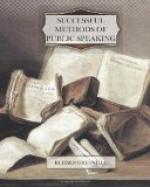The great objection to memoriter speaking is that it limits and handicaps the speaker. He is like a schoolboy “saying his piece.” He is in constant danger of running off the prescribed track and of having to begin again at some definite point.
The most effective speaker to-day is the one who can think clearly and promptly on his feet, and can speak from his personality rather than from his memory. Untrammelled by manuscript or effort of memory, he gives full and spontaneous expression to his powers. On the other hand, a speech from memory is like a recitation, almost inevitably stilted and artificial in character.
THE STUDY OF WORDS AND IDEAS
Those who would become highly proficient in public speaking should form the dictionary habit. It is a profitable and pleasant exercise to study lists of words and to incorporate them in one’s daily conversation. Ten minutes devoted regularly every day to this study will build the vocabulary in a rapid manner.
The study of words is really a study of ideas,—since words are symbols of ideas,—and while the student is increasing his working vocabulary, in the way indicated, he is at the same time furnishing his mind with new and useful ideas.
One of the best exercises for the student of public speaking is to read aloud daily, taking care to read as he would speak. He should choose one of the standard writers, such as Stevenson, Ruskin, Newman, or Carlyle, and while reading severely criticize his delivery. Such reading should be done standing up and as if addressing an audience. This simple exercise will, in the course of a few weeks, yield the most gratifying results.
It is true that “All art must be preceded by a certain mechanical expertness,” but as the highest art is to conceal art, a student must learn eventually to abandon thought of “exercises” and “rules.”
ESSENTIAL QUALITIES OF THE PUBLIC SPEAKER
The three greatest qualities in a successful public speaker are simplicity, directness, and deliberateness.
Lincoln had these qualities in preeminent degree. His speech at Gettysburg—the model short speech of all history—occupied about three minutes in delivery. Edward Everett well said afterward that he would have been content to make the same impression in three hours which Lincoln made in that many minutes.
The great public speakers in all times have been earnest and diligent students. We are familiar with the indefatigable efforts of Demosthenes, who rose from very ordinary circumstances, and goaded by the realization of great natural defects, through assiduous self-training eventually made the greatest of the world’s orations, “The Speech on the Crown.”
Cicero was a painstaking disciple of the speaker’s art and gave himself much to the discipline of the pen. His masterly work on oratory in which he commends others to write much, remains unsurpassed to this day.




